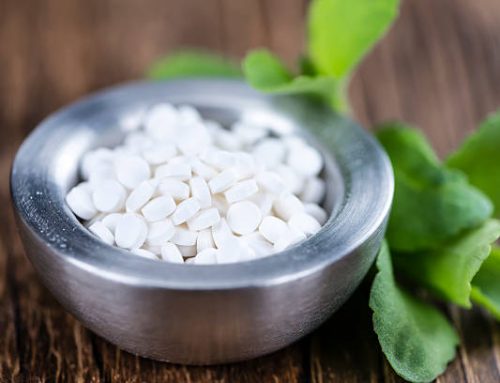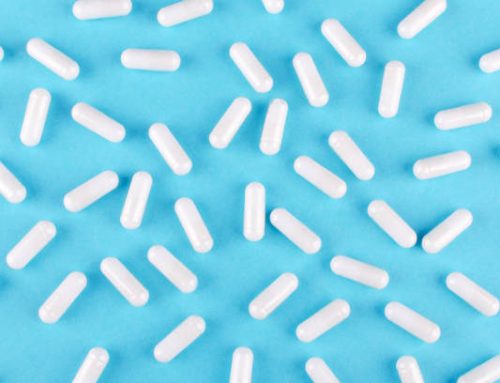Are you ready to take your health to the next level? Look no further than the tiny seed with big benefits: flaxseed. This powerhouse superfood has long been lauded for its impressive nutritional and herbal properties, and for good reason. Packed with essential nutrients, healthy fats, and potent antioxidants, flaxseed has the power to transform your body and mind, revitalizing your health and boosting your well-being in countless ways. So, are you ready to supercharge your health with the incredible benefits of flaxseed? Let’s get started.

1. Introduction: Meet Flaxseed, The Tiny Seed with Big Benefits
Have you ever heard of the health benefits of flaxseed? Despite its tiny size, flaxseed is packed with powerful nutrients that can have a significant impact on your overall wellbeing. Flaxseed is one of the oldest crops in the world, cultivated for its versatility and medicinal properties for thousands of years. It’s no wonder why this little seed has been praised for its ability to improve digestive health, lower cholesterol, and even reduce the risk of chronic diseases such as diabetes and cancer.
Flaxseed is rich in essential fatty acids, particularly alpha-linolenic acid (ALA), a type of omega-3 fatty acid that is crucial for maintaining good health. The fatty acids in flaxseed have anti-inflammatory properties that help protect against heart disease, stroke, and arthritis. In addition, flaxseed is comprised of lignans, compounds that contain antioxidants and phytoestrogens that can help reduce the risk of breast cancer.
- Flaxseed is an excellent source of fiber, which can improve digestive health and promote regular bowel movement.
- Flaxseed contains high levels of vitamins and minerals, including thiamin, magnesium, and phosphorus.
- Adding flaxseed to your diet can help reduce inflammation, which can have a positive impact on skin health, joint pain, and other health conditions affected by inflammation.
Flaxseed can be easily incorporated into your diet, as it can be consumed whole, ground, or in oil form. You can sprinkle it on oatmeal or yogurt, add it to smoothies or salads, or use it in baking as a healthy substitute for eggs or oils. When consuming flaxseed, it’s best to start with small amounts and gradually increase your intake to prevent digestive discomfort.
In conclusion, flaxseed is a nutrient powerhouse that can have significant health benefits. Adding flaxseed to your diet can be an easy and delicious way to improve your overall wellbeing. It’s time to start reaping the benefits of this tiny seed and take control of your health!
2. Flaxseed’s Nutritional Powerhouse: The Nutrients That Makes It A Superfood
Flaxseed, also known as linseed, is a nutritional powerhouse that has been consumed for centuries due to its incredible health benefits. This superfood is loaded with key nutrients and fiber that offer a range of health advantages. Here are the nutrients that make flaxseed a superfood that you should be incorporating into your diet:
1. Omega-3 fatty acids: Flaxseed is one of the richest plant sources of omega-3 fatty acids, which are important for brain health, reducing inflammation, and improving heart health. Omega-3 fatty acids are essential fats that cannot be produced by the body and must be obtained from the diet. By adding flaxseed into your daily diet, you can increase your intake of these essential fatty acids.
2. Lignans: Flaxseed is also an excellent source of lignans, which are antioxidants that help the body fight against harmful free radicals. Lignans also have estrogen-like properties that can help regulate hormone levels and promote overall health. Additionally, research shows that lignans may have anti-cancer properties, making flaxseed an important dietary addition to prevent chronic diseases.
3. Fiber: Flaxseed is rich in both soluble and insoluble fiber, providing a range of digestive health benefits. Soluble fiber helps regulate blood sugar levels, while insoluble fiber helps regulate bowel movements and prevent constipation. Fiber is also important for weight management, as it helps keep you feeling full and satisfied for longer periods of time.
4. Protein: Flaxseed is an excellent source of plant-based protein. Protein is essential for building and repairing tissues in the body and helps keep you feeling satisfied and full after meals. Adding flaxseed to your meals is a great way to boost your protein intake, especially if you follow a vegetarian or vegan diet.
Incorporating flaxseed into your diet is easy and delicious. Simply sprinkle it on top of your morning oatmeal or yogurt, add it to smoothies, or use it as a replacement for eggs in baking recipes. With its range of health benefits, flaxseed is truly a superfood that can help support overall health and well-being. So why not start incorporating it into your diet today?
3. Health Benefits: Fight Diseases and Boost Overall Health with Flaxseed
Flaxseed is considered a superfood, and for good reason. These small seeds pack a nutritional punch, offering a wealth of health benefits that can help you fight diseases and boost your overall wellness.
One of the most significant benefits of flaxseed is its high concentration of alpha-linolenic acid (ALA), which is a type of omega-3 fatty acid that has been shown to reduce the risk of heart disease. Flaxseed also contains lignans, which have antioxidant properties and may help prevent cancer. Additionally, flaxseed is a rich source of fiber and can aid in digestive health and weight management.
Here are the top health benefits of flaxseed:
1. Reduces Inflammation – Flaxseed is a potent anti-inflammatory agent that can help reduce inflammation in the body, particularly in the gut. This can help alleviate symptoms of conditions like irritable bowel syndrome (IBS) and Crohn’s disease.
2. Lowers Cholesterol – The high concentration of ALA in flaxseed can help lower LDL, or “bad” cholesterol levels, which in turn can reduce your risk of heart disease.
3. Stabilizes Blood Sugar – Flaxseed contains both soluble and insoluble fiber, which can help regulate blood sugar levels and keep you feeling full for longer periods.
4. Boosts Immunity – The lignans in flaxseed have immune-boosting properties that can help fight off infections and prevent illness.
5. Promotes Skin Health – The omega-3 fatty acids in flaxseed can help keep your skin moisturized and healthy, while the antioxidant properties of lignans can help prevent premature aging.
Incorporating flaxseed into your diet is easy. You can sprinkle it on your morning oatmeal or yogurt, add it to smoothies and baked goods, or use it as a substitute for eggs in vegan recipes. With its many health benefits, flaxseed is a simple and delicious way to boost your overall wellness and live your best life.
4. How to Incorporate Flaxseed into Your Diet: Quick and Easy Ways
If you’re looking to add more essential fatty acids, fiber, and protein to your diet, then flaxseed is the perfect supplement for you. Flaxseed is an excellent source of omega-3 fatty acids, lignans, and fiber, making it incredibly beneficial for your overall health. Incorporating this incredible supplement into your diet can be super easy and enjoyable with these quick and easy ways.
1. Sprinkle Flaxseed on Your Oatmeal or Yogurt
One of the easiest ways to incorporate flaxseed into your diet is by simply sprinkling it on your oatmeal or yogurt. You can sprinkle a spoonful on top of your breakfast or mix it into the bowl for an extra crunch. This superfood will add a nutty flavor and an incredible amount of nutritional benefits.
2. Blend Flaxseed into Your Smoothies
Another great way to incorporate flaxseed into your diet is by blending it into your smoothies. Adding a tablespoon of flaxseed to your smoothies can provide a smooth, creamy texture and an exceptional dose of nutrition. You can also add some fruits and veggies like blueberries or strawberries for added flavor and nutrition.
3. Use Flaxseed as an Egg Substitute
If you’re looking to minimize your consumption of animal products, flaxseed can be used as an egg substitute in your baked goods. For one egg, mix one tablespoon of flaxseed with three tablespoons of water, and let it sit for five to ten minutes to create an egg-like texture. This substitution can provide a healthy twist to your favorite recipes and can help you consume more nutrients.
4. Incorporate Flaxseed into Your Salad Dressing
Another simple way to incorporate flaxseed into your diet is by adding it to your salad dressing. Taking olive oil, vinegar, and one tablespoon of flaxseed, make your own healthy salad dressing with a unique flavor and nutritional benefits. This dressing can work effortlessly with different salad variations.
Flaxseed is an incredibly easy and versatile supplement to incorporate into your diet. By adding this superfood to your meals or snacks, you’re enhancing your overall health and getting a boost of essential nutrients. With these quick and easy ways, you’ll be able to add this superfood to your diet with no fuss.
5. Conclusion: Supercharge Your Health Journey with Flaxseed
Flaxseed is an incredible addition to any diet, packed with a variety of benefits that can help to supercharge your health journey. From reducing inflammation to promoting heart health and even aiding in weight loss, this small but mighty superfood is a must-have for anyone looking to optimize their well-being.
One of the most impressive benefits of flaxseed is its ability to support digestive function. Thanks to its high fiber content, flaxseed can aid in regularity and help to prevent constipation. It is also a natural source of intestinal prebiotics, which can help to promote a healthy gut microbiome and improve overall digestive health.
In addition to its digestive benefits, flaxseed is also an excellent source of omega-3 fatty acids, which are essential for heart health. A diet rich in omega-3s has been linked to reduced risk of heart diseases such as heart attack and stroke. Flaxseed is also rich in lignans, which have been shown to promote breast health and reduce the risk of certain types of cancer.
Finally, flaxseed is an excellent source of plant-based protein and can be a valuable addition for those following a vegetarian or vegan diet. In addition to its protein content, flaxseed is also rich in other important nutrients such as magnesium, phosphorus, and vitamin B6.
Incorporating flaxseed into your diet is easy – try mixing a tablespoon into your morning smoothie or sprinkling it over your favorite salad. You can also try using flaxseed oil as a natural alternative to traditional cooking oils. With its abundance of health benefits, adding flaxseed to your daily routine is a simple way to supercharge your health journey and support overall wellness. Outro:
Incorporating flaxseed into your diet is an easy and tasty way to supercharge your health. This tiny seed has big benefits, from reducing inflammation to improving heart health and aiding digestion. With its abundance of essential fatty acids, fiber, and lignans, flaxseed is one of nature’s most powerful superfoods. So why wait? Start adding flaxseed to your meals and enjoy the many benefits it has to offer. Here’s to a healthier, happier you!
FAQ:
Q: What is flaxseed?
A: Flaxseed is a tiny, nutrient-dense seed that is packed with essential fatty acids, fiber, and lignans. It has been used for centuries for its health-promoting properties.
Q: What are the health benefits of flaxseed?
A: Flaxseed has numerous health benefits, including reducing inflammation, improving heart health, aiding digestion, and promoting healthy skin and hair. It also contains antioxidants, which help protect against free radical damage.
Q: How do I incorporate flaxseed into my diet?
A: Flaxseed can be added to smoothies, oatmeal, yogurt, salads, or used as a substitute for eggs in recipes. Ground flaxseed is easier to digest and absorb, but whole flaxseed can be used too.
Q: Can children eat flaxseed?
A: Yes, children can consume flaxseed in small amounts. However, it’s best to consult with a healthcare professional before adding it to their diet.
Q: Can flaxseed cause any side effects?
A: Flaxseed is generally safe for most people when consumed in moderation. However, some people may experience digestive issues or allergic reactions. It’s important to start with a small amount and gradually increase the intake to avoid any side effects.




